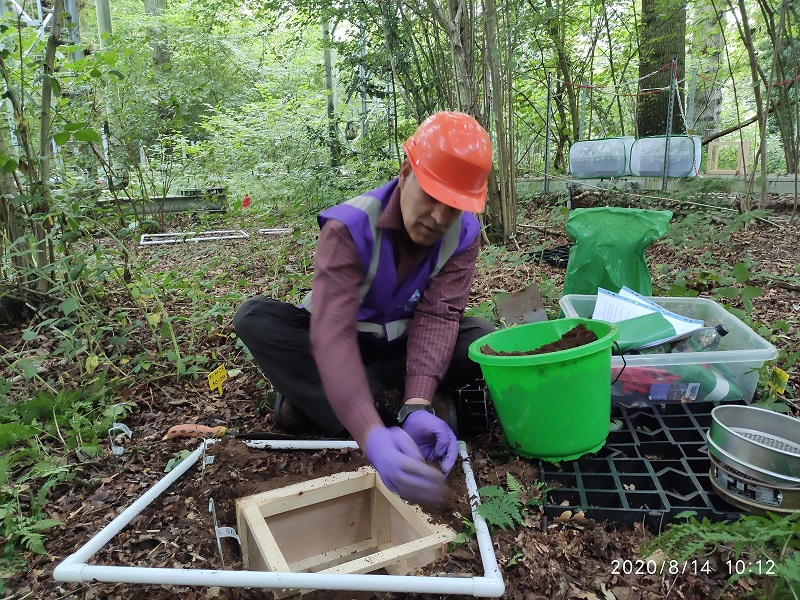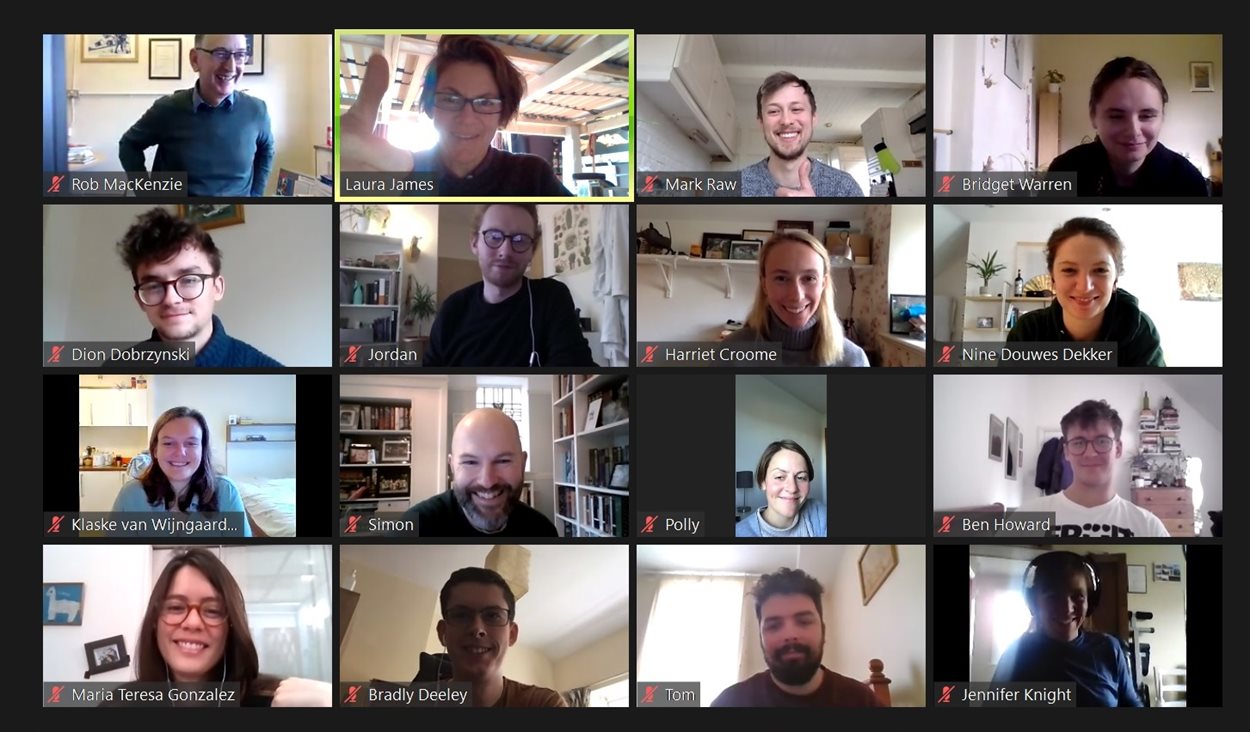
Dr Sami Ullah Principal Investigator for FACE Underground project, installing root boxes. He and his team are interested to know if exudation rates and its chemical composition will change in response to elevated CO2 fumigation of the forest. Photo credit: Jiaojioa Ma
“FACE-IN” the PANDEMIC
by Kris Hart, BIFoR Operations Manager
The COVID-19 pandemic has produced unprecedented challenges to society & substantial challenges to research at the BIFoR Free-Air Carbon Dioxide Enrichment (FACE) facility. 2020 marks the fourth year wherein, thanks to the impressive infrastructure at BIFoR FACE, we are able to immerse 30 meter-wide plots of mature oak forest with elevated CO2 concentrations. This year was set to be our busiest growing season yet, due to ever increasing numbers of undergraduate research projects, PhD students & research collaborations, including the first growing season for the QUINTUS project. My team have been able to keep the facility open throughout 2020. A stringent risk assessment process enabled researchers to return in June. In the interim, the technical team at BIFoR FACE worked tremendously hard to ensure the research carried out by PhD students and academic colleagues was continued uninterrupted. Thanks to Angeliki Kourmouli, soil sampling campaigns, renowned for needing a huge human resource, still ran with military precision. Also, Tom Downes joined the team right at the start of lockdown as the new Engineering Apprentice, and under the guidance of Nick Harper, he continues to strive despite all the disruption.
Video conferencing has been a lifeline for many researchers. Weekly meetings considerably helped with logistics & presentations helped keep spirits high so the research community could continue to “talk science”. Many of our scientists have taken the opportunity of virtual meetings to engage in CPD training & contribute to training, podcasts, and articles (Ben Howard, Jenny Knight & Eszter Toth).
Every team member has gone above and beyond expectations to ensure we have overcome the challenges presented by this pandemic. The long-term impact of the BIFoR FACE experiment has been maintained by the collective efforts of Professional Services and the academic team working together, thank you to everyone involved.
New Appointments
We welcome Dr Florian Busch, Dr Megan McDonald and Dr Mojgan Rabiey to School of Biosciences as Senior Lecturer (Florian), Birmingham Fellow (Megan) and Postdoc Fellow (Mojgan). Florian’s research interests relate to plant photosynthesis while Megan’s research is focused on plant pathogenic fungi and Mojgan will be studying evolution of plant pathogenic bacteria on cherry trees.
Dr Adriane Esquivel Muelbert and Dr Laura Graham have joined the School of Geography and Earth Sciences (GEES), as Lecturer in Global Forest Ecology (Adriane) & Birmingham Fellow (Laura). Adriane is a forest ecologist with deep roots in the tropics, aiming to understand the impacts of global change on forests while Laura’s research interests are in spatial ecology – particularly in the effects of habitat fragmentation on biodiversity & ecosystem services.
Hold the dates
Trees for the Future Webinar
10th December 2020, 14:00 -16:45
This webinar and discussion is designed to present the scientific case for the structure and design of future forests and discuss the strategies that would produce the maximum benefit to the environment, economy and society. Confirmed speakers are Prof Rob MacKenzie (University of Birmingham), Prof Jürgen Bauhus (University of Frieburg, Germany) and Dr Matthew Jordan (UK Parliament, Westminster, UK)
Register online
BIFoR 5th Annual virtual meeting
27th & 28th January 2021 (virtual)
Registration
Our annual community meeting provides us with the opportunity to disseminate early results and receive feedback from research and practitioner communities.
Treescapes 2021 (virtual)
30 June to 1 July 2021 TBC. Please check their website for dates to be confirmed soon.
A unique event being led by early career researchers from a number of UK universities and disciplines to stimulate conversations between the research and woodland practitioner communities
Trees for the Future
3rd to 4th November 2021
Diversity and complexity for resilience and carbon storage
A main objective of this conference is to explore state-of-the-art scientific evidence showing that higher tree species diversity enables higher productivity and stability, with a lower susceptibility to biotic and abiotic stress, together with a portfolio of ecosystem services, as well as economic and management benefits.
A special Issue of Food and Energy Security (Impact Factor 5.2) on Tree Planting for Environmental Benefits is open now.
Future research & policy
Congratulations to Dr Sami Ullah on his appointment to the DEFRA Nutrient Management Expert Group to advise on policy for improving food security and enhancing environmental quality.
Dr Tom Pugh successfully applied to host a Marie Curie Fellowship: ForMMI: Forest management-mortality interactions – quantification of management effects on tree mortality and implications for carbon cycling.
Prof Vincent Gauci and Prof Fiona Nunan have both secured Global Challenges Research Funding: Vincent’s project looks at “Tackling the increase in methane from the Global South” and Fiona’s project develops “Sustainable resource governance solutions in sub-Saharan Africa”.
Research highlight: Amazon forest resilience
Can the Amazon tolerate droughts? By Adriane Esquivel-Muelbert
The frequency and strength of droughts have increased across the Amazon but their impact on the largest and most diverse tropical forest on Earth remain largely unknown. A paper co-authored by Adriane Esquivel-Muelbert with colleagues from INPA (Brazilian Institute of Amazonian Research) and ForestPlots showed that forests on shallow water tables – approximately one third of Amazonian forests - are remarkably resistant to droughts. Following the 2015/16 El Niño, recruitment of palms and trees increased but no change in mortality was detected in Central Amazon. This shows that these forests are more resistant to climatic changes than previously thought and emphasises the role of local hydrology on forest resilience. These findings were possible due to long-term forest plots, crucial to our understanding of how forests are and will be responding to global change.
Adriane has also just very recenlty published a paper in Nature Communications 'Tree mode of death and mortality risk factors across Amazon forests' - our congratulations to Adriane!
Doctoral research
Joining our team of 26 doctoral researchers this year are 6 further students under the Leverhulme Trust-funded Forest Edge Doctoral Scholarship Programme (DSP). Their research will address very topical areas which might be difficult to find funding for were it not for this new DSP.
- Harriet Croome Investigating how changing interactions between humans and elephants affect forest socio-ecological systems in drylands. Supervisors Brock Bersaglio (International Development Department (IDD)), Fiona Nunan (IDD)
– Dion Dobrzynski, Forest Ecology in Fantasy Fiction: Mobilising the Imaginative Resources of Fantasy Fiction for Living with Forests . Supervisors John Holmes (English), Jon Sadler (GEES)), Will Tattersdill (English)
– Jordan Johnston, Forest resilience and recovery through the lens of volcanic disturbances. Supervisors Seb Watt (GEES), Tom Pugh (GEES), Tom Matthews (GEES), Susanna Ebmeier (Leeds)
– Thomas Kaye, Where the Wildwoods respire Alexandra Harris (English), Matthew Ward (English)
– Mark Raw, Priming of defence in an elevated CO2 world Estrella Luna Diez (Bio), Scott Hayward (Bio)
– Klaske van Wijngaarden From branch to forest to globe: How do trees choices regarding growth affect forest responses to increased carbon dioxide levels? Tom Pugh (GEES), Josh Larsen (GEES), Ben Smith (Western Sydney University (WSU)) Belinda Medlyn (WSU)

Student projects
We’re proud of the following students, who despite the many disruptions, produced some very interesting dissertations.
Ellen Heimpel, top plant biology student, was the winner of the Biosciences John Humphreys Memorial Prize in Plant Biology. Ellen worked with Dr Graeme Kettles to research the impact of carbon dioxide on crop and tree pathogens.
Elin Cunningham from Harper Adams couldn’t make her planned trip to Kruger National Park, so instead, worked with Dr Scott Hayward and Liam Crowley using data collected from BIFoR FACE, to investigate invertebrate assemblage in temperate woodlands during extreme weather events.
Chris Griffin, a Biosciences student graduated with a first awarded for his final year honours project which was working with Dr Scott Hayward “The impact of climate change on winter active Lepidoptera”
Li Hua and Iwan Evans both worked with Dr Estrella Luna-Diez to look at mixed tree planting and Ash Dieback disease.
Ya Gao, worked with Prof Rob MacKenzie over many virtual meetings to look at “Projected Biogenic Volatile Organic Compounds (BVOCs) in a temperate forest under elevated CO2 ”
To subscribe to the mailing list to receive notification of the next spring 2021 BIFoR Newsletter please email d.brettle@bham.ac.uk. If you have any other queries please contact us.